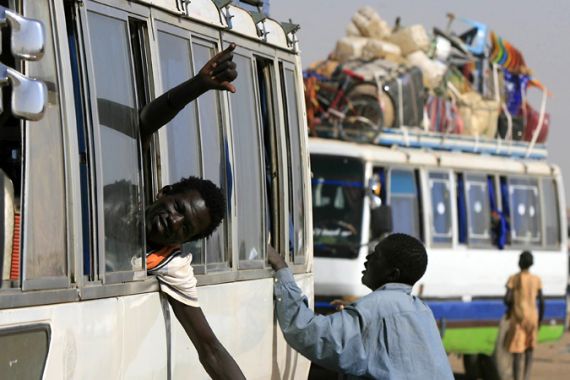Thousands flock to south Sudan
The UN says an estimated 2,000 people are arriving every day from the country’s north for Sunday’s referendum.

An official with the United Nations has said that 143,000 southerners have arrived in south Sudan since the end of October 2010 for Sunday’s referendum, which could result in the country’s partition.
David Gressly, the UN regional co-ordinator for Southern Sudan, said on Thursday that thousands more are arriving into southern states daily.
“An estimated 143,000 southerners have left northern Sudan since the end of October, and more are continuing to arrive in the country’s southern states at a rate of about 2,000 people per day,” he said.
“About two-thirds of the returnees are believed to have reached their hometowns and villages. But many remain stuck in the capital cities of their native states in the south without any means of transport to reach their home towns and villages, and UN humanitarian agencies are working with the government of Southern Sudan to support their return.”
Hundreds of Sudanese southerners have been stranded south of Khartoum, the capital of the north, for more than three weeks waiting for the semi-autonomous government of Southern Sudan to provide them with transport to go back home for the January 9 referendum.
The stranded returnees say they do not have money and have appealed to the Southern Sudan government to secure their transport home.
On reports of fears of a return to war, Gressly said the UN had seen no evidence of hostilities by either side.
“The general security situation of Southern Sudan is currently stable and generally quiet. Tensions along the north-south border have eased over the last three weeks,” he said.
“Reports of major troop build-ups on either side of the north-south border appear to have been exaggerated and the movements we have seen to date seem to date have involved units on scale of a company or platoon level.”
Tens of thousands of people have returned to south Sudan in the last two months according to the UN humanitarian co-ordinating agency, OCHA. The rate of return has increased rapidly with the approach of referendum day.
An estimated four million southerners were uprooted by the fighting, most of them taking shelter in ramshackle slums and refugee camps around Khartoum.
International observers
Sunday’s referendum is part of the 2005 Naivasha Agreement between the central Sudanese government and the Sudan People’s Liberation Movement, or SPLM.
The European Union will have 104 observers and experts present for the vote. The Carter Center, founded by Jimmy Carter, the former US president, is deploying at least 75 observers. China, which has large investments in Sudan’s oil sector, is also sending observers.
Carter himself, along with John Kerry, a US senator, arrived in Sudan on Friday.
Asked by Al Jazeera what his message was to people in the north and the south, Carter said: “Just accept the decision of the southerners in the referendum peacefully, no matter whether it is to stay part of Sudan or to form a new nation.
“Then after that, devote full time to the complete implementation of the Comprehensive Peace Agreement provisions dealing with Abyei, dealing with the borders and and divisions of wealth, in particular oil.”
Almost four million voters have registered over the last several months, including 116,000 southerners who live in the north and 60,000 in eight other countries, including the US.
Voters will be using a ballot showing two images: one of a lone hand that represents independence and the other image depicting two clasped hands, along with the words “Secession” and “Unity.”